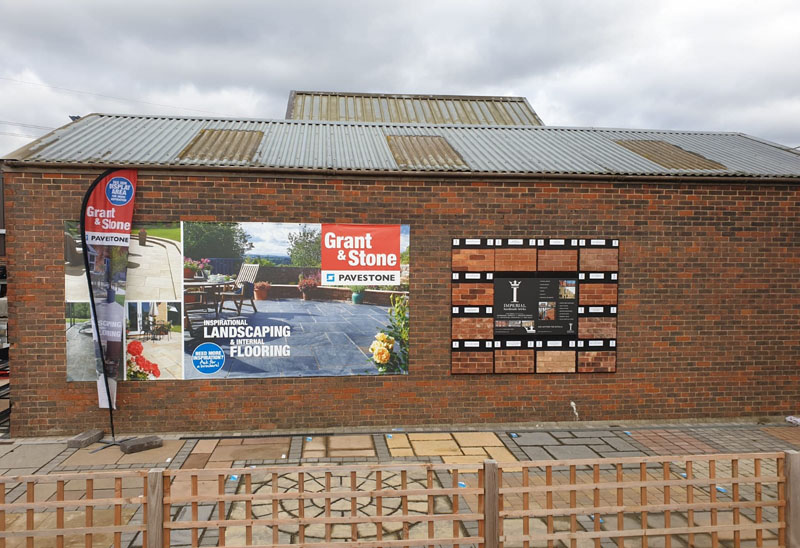
PBM speaks with Grant & Stone and Imperial Bricks to discuss the relationship between merchant and manufacturer with regards to managing the supply chain issues surrounding what is arguably the country’s core building material.
Whilst bricks might not be the most expensive component in a new build, reportedly representing around just 6% of the total cost on average, they are certainly one of the most significant. In the UK they’re the most popular building material, one of the builders’ merchant sector’s staple lines, and they have a huge impact on the finished project.
The increase of smaller, luxury developments — coupled with increasing interest in restoring existing buildings — has led to greater demand for handmade bricks. With specialist knowledge of local conditions and the requirements of planning and conservation, backed by strong support from the supplier, the merchant is the go-to authority on bricks.
One merchant that is recognising the growing trend of handmade bricks is Grant & Stone. Purchasing Manager Mark Smith explains the success of the merchant’s relationship with Imperial Bricks, with the specialist manufacturer of traditional handmade and reclamation bricks helping the company make the most of a rapidly expanding market.
Securing 14th place in PBM’s most recent ‘Top 20’ merchant countdown, Grant & Stone needs little introduction and especially to its target markets in Central Southern England. With a total of 29 branches covering Oxfordshire, Buckinghamshire, Berkshire and Middlesex, it’s a major independent merchant and operates dedicated branches for heavyside, plumbing, electrical, kitchens and bathrooms, lighting and — its latest addition — timber.
Founded 32 years ago, the company is still family-run and can supply ‘everything required to build a house, from the foundations to the final decoration.’ Its eight heavyside branches generate approximately 50% of the business, with handmade bricks from Imperial currently accounting for 10% of its brick sales.
The merchant trades from four counties, each with its own distinctive type of brick. Clay varies from region to region, so local bricks differ widely — even over a few miles, the colour and texture can change dramatically. So, the stockist’s brick range includes Soft Red, Reclamation Soft Red, Georgians, Pre-War Commons and Reclamation Yellows, in both imperial and metric sizes.
Mark has been with Grant & Stone for 12 years, and has seen it grow from seven branches to its current size. He’s seen demand for high quality, handmade bricks increase year-on-year, and he works closely with Imperial.
“Demand is outstripping supply, for even basic bricks and blocks,” Mark explains. “But our customers also want something different, something to set their developments apart from the crowd. That’s what Imperial offers. It’s not just having a particular product or range that makes something sell — it’s the package of service, training, marketing materials and driving force behind support that makes the difference.
Alan Kent, Sales Manager at Grant & Stone, cites the back-up his team gets from the supplier and comments: “Imperial helps us provide the right product for our customer. As well as offering in-house training, it’ll send Area Sales Managers out on the road with our sales force if needed. And the brick matching service is really useful, very beneficial to our business. It speeds up the process and means the customer gets their order in good time.
“Sometimes matching can be done via an emailed photo but often it involves a site visit from an ASM. They work hard to provide an exact match, often producing several blends for the customer to choose from. Our customers can then be confident that the bricks are exactly right, with no time-consuming on-site blending for the brick layer.”
He continues: “The company also keeps us up-to-date with presentations on products and current lead times, and they have useful point of sale literature we can offer our customers.”
Grant & Stone is a founding member of the National Buying Group, with Mark serving on its Brick Committee. The manufacture was encouraged to join, with Mark saying: “I was always confident there was a deal ready to be done which would benefit all parties. Imperial joined the group and it’s proved a benefit to both companies.”
The supplier’s merchant team provides solutions and services for all types and size of merchant, whether they are brick specialists or general merchants looking to introduce new ranges to their business. Mark said: “Imperial’s team has been very helpful, supporting us proactively from day one — for example, Grant & Stone was one of the first merchants to organise supplier days, where customers can meet manufacturers and suppliers, and Imperial has sponsored several of them.”
Jason Hughes, Imperial’s Managing Director, added: “Imperial works hard to develop relationships that last and that offer benefits to all parties, so we are proud of our success with customers. Whether it’s accompanying sales staff to advise on brick choices, sending Area Sales Managers on-site to help match bricks or mixing a bespoke colour for the builder, it’s all about support and helping merchants to sell.
“We provide personalised POS displays, brick sample boards and brick display towers which make it easy to show merchant customers the versatility, durability and high quality of handmade bricks. Imperial supplies more than ‘50 Shades of Clay’ from stock, in both imperial and metric dimensions — metric bricks being more suitable for new build as they fit with modern blocks and lintels, while imperial are best suited to extensions or renovation of older properties.
“We also understand the importance of consistent and reliable supply,” ends Jason. “So, we maintain high stock levels to meet demand. Our aim is to make it as easy as possible for our merchant customers to provide the best possible service to their customers.”










